

Learning and Teaching Sustainability. Los métodos de enseñanza más eficaces para la educación actual. Forma Equipos Cooperativos - Cinética. 7 formas para reducir la carga cognitiva de los usuarios. Cognitive load theory report aa1. Key Issues in Teaching and Learning. Sunsetted: Key Issues in Teaching and Learning For more information regarding the key trends, emerging technologies and practices, and future implications in educational technology, refer to the EDUCAUSE Horizon Report.
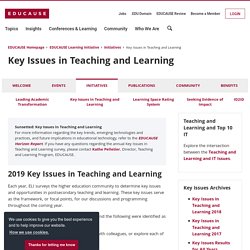
If you have any questions regarding the annual Key Issues in Teaching and Learning survey, please contact Kathe Pelletier, Director, Teaching and Learning Program, EDUCAUSE. Each year, ELI surveys the higher education community to determine key issues and opportunities in postsecondary teaching and learning. These key issues serve as the framework, or focal points, for our discussions and programming throughout the coming year. More than 1,400 community members voted, and the following were identified as the 2019 Key Issues. Download the infographic below and share with colleagues, or explore each of the issues more deeply with these resources. Issues, Technologies, and Trends Resources Take a Deeper Dive into the Key Issues 1. 2. 3. 4. 5. 6. 5 Common Misconceptions About Bloom's Taxonomy. 5 Common Misconceptions About Bloom’s Taxonomy by Grant Wiggins & The TeachThought Staff Admit it–you only read the list of the six levels of Bloom’s Taxonomy, not the whole book that explains each level and the rationale behind the Taxonomy.
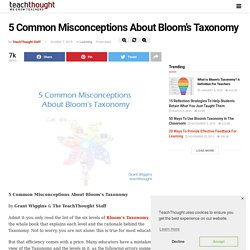
UDL Toolkit. (19) Evaluación de los aprendizajes. Todo sobre rúbricas: qué son, cómo elaborarlas y ejemplos editables. Impact Rankings 2020. Diálogos sobre la evaluación en el aula. Why PBL Can’t Wait. True confession: Since being under a “stay at home order” I spend way more time on my phone and social media than I like to admit.
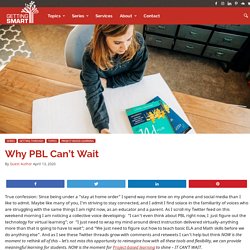
Maybe like many of you, I’m striving to stay connected, and I admit I find solace in the familiarity of voices who are struggling with the same things I am right now, as an educator and a parent. Using Feedback to Deepen the Inquiry. We know effective learning cannot take place without formative assessment practices to match.
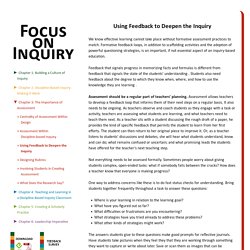
Formative feedback loops, in addition to scaffolding activities and the adoption of powerful questioning strategies, is an important, if not essential aspect of an inquiry-based education. Feedback that signals progress in memorizing facts and formulas is different from feedback that signals the state of the students’ understanding . Students also need feedback about the degree to which they know when, where, and how to use the knowledge they are learning .
Assessment should be a regular part of teachers’ planning. Assessment allows teachers to develop a feedback loop that informs them of their next steps on a regular basis. Not everything needs to be assessed formally. One way to address concerns like these is to do fast status checks for understanding. VAEP RITA. Aprendizaje activo en e-learning, MOOCs y microcredenciales - Anant Agarwal, fundador de edX. La importancia de formular buenas preguntas. Transmedia Literacy. Propiedad intelectual, derechos de autor y copyright. The Education Crisis: Being in School Is Not the Same as Learning. But even heroes need help.
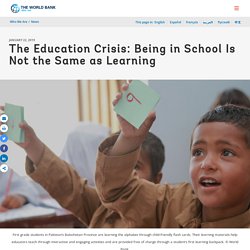
We need to be sure that all teachers are motivated to do their best and that they are equipped with what they need to teach effectively. To support countries in reforming the teaching profession, the World Bank is launching “Successful Teachers, Successful Students.” This global platform for teachers addresses the key challenges of making all teachers effective, making teaching a respectable and attractive profession with effective personnel policies, and ensuring teachers are equipped with the right skills and knowledge before entering the classroom and subsequently supporting them throughout their careers.
Technology offers new possibilities for teaching and learning Rapid technological change is raising the stakes. One of the most interesting, large scale educational technology efforts is being led by EkStep, a philanthropic effort in India. 1.1 Modelos De Escuela: El Rol De La Pedagogía Diferencial Y El Mastery Learning. 1.1 Modelos De Escuela: El Rol De La Pedagogía Diferencial Y El Mastery Learning. - Lessons. Explore Our World - National Geographic Learning. Education transforms lives. Education transforms lives and is at the heart of UNESCO’s mission to build peace, eradicate poverty and drive sustainable development.
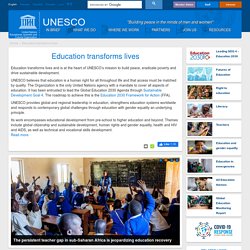
UNESCO believes that education is a human right for all throughout life and that access must be matched by quality. The Organization is the only United Nations agency with a mandate to cover all aspects of education. It has been entrusted to lead the Global Education 2030 Agenda through Sustainable Development Goal 4. The roadmap to achieve this is the Education 2030 Framework for Action (FFA). Middle Schools - Fanning Howey. Middle school isn’t just a time of transition.
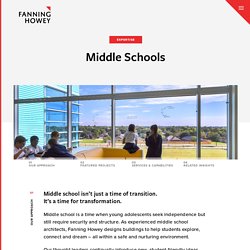
It’s a time for transformation. Middle school is a time when young adolescents seek independence but still require security and structure. As experienced middle school architects, Fanning Howey designs buildings to help students explore, connect and dream – all within a safe and nurturing environment. Our thought leaders continually introduce new, student-friendly ideas into the middle school environment.
DECA classrooms to build entrepreneurship skills, makerspaces for project-based learning and high-tech labs for Next Generation Science Standards are all part of our engaging designs. Fanning Howey-designed middle schools give students an empowering environment for building autonomy and self-sufficiency. Fanning Howey’s experience with middle school design includes DECA classrooms, STEM labs, media centers Project Lead the Way labs, outdoor learning areas and other high-performance learning environments.
Los avances de China en educación Opinión. Actualizado en 11/10/2019 a las 07:00 Durante una reciente visita a Shanghái, Hangzhou y Shenzhen tuve la oportunidad de conocer los avances en tecnología y educación, y fueron varias las cosas que llamaron mi atención.
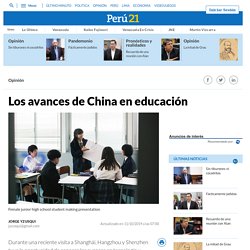
Una es que los colegios ya están empezando la enseñanza de cursos de inteligencia artificial y de tecnología digital a sus alumnos desde los 10 años. Otra es que la educación no la dejan solo en manos de los maestros, sino en equipos multidisciplinarios que incluyen diseñadores de producto, ingenieros y educadores. También es relevante ver cómo obtienen millones de datos de aulas y plataformas de aprendizaje autónomas, y cómo analizan esa información para entender mejor los procesos de aprendizaje. Portable Practices for Promoting Self Care_Final.pdf.